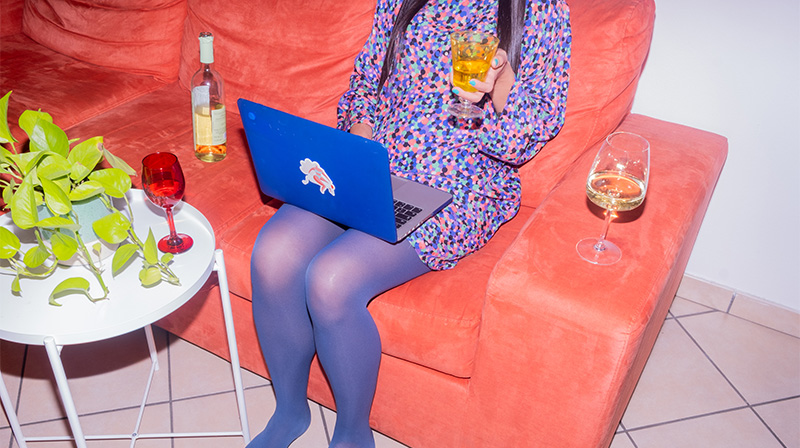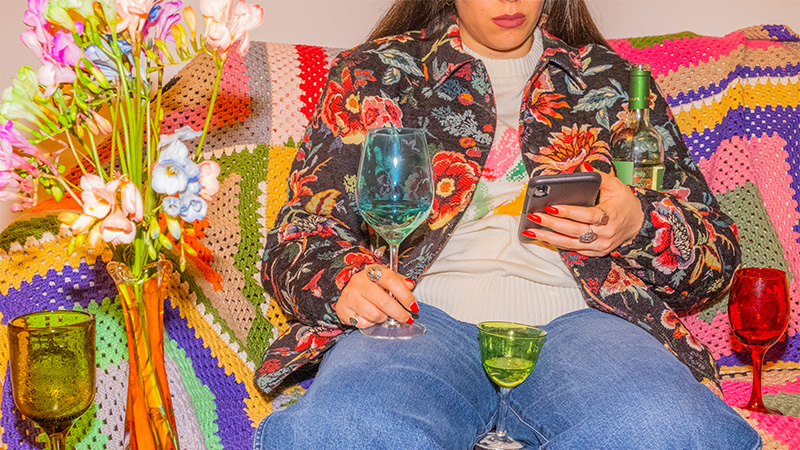It’s April 2021 and Jessica Smalley is sitting in front of a camera filming a video for her growing YouTube channel.
She pours a glass of wine — slightly more generous than a standard 5-ounce serving — and shares her laptop screen. Jess is about to embark on some online tispy-shopping, bringing her viewers along for a slightly chaotic shopping haul spanning multiple retail sites.
The YouTube vlogger, who’s run her @KickinItwithJess account for eight years, searches for an array of seemingly unrelated items. She clicks “add to cart” on pebble ice molds, a blue coffee tumbler, and a handful of trendy tops.
Don’t Miss A Drop
Get the latest in beer, wine, and cocktail culture sent straight to your inbox.
Smalley is certainly not the first, or only one, to indulge in some intoxicated, online retail therapy. Every year millions of Americans will follow a similar, often regrettable path. From virtual laughs on Reddit groups to encouragement from shopping apps’ algorithms, drunk online shopping certainly isn’t an isolated experience. For retailers, however, the equation is ideal: Young adults plus disposable income, and a seasoning of liquid courage, equals a greater potential for impulse purchases.
Don’t be surprised if you discover a mystery package on your doorstep after a night of drinking — it can truly happen to anyone.
Sloshed Shoppers, by the Numbers
A recent report by Finder.com revealed that 45 million Americans confessed to drunk shopping in the past year, accounting for some $14 billion spent nationwide. The data, collected through a nationwide online survey of over 2,000 U.S. adults, found that 72 percent of Gen Z and 66 percent of millennials have drunk-shopped. Across generational boundaries, 47 percent of shoppers report purchasing apparel and another 47 percent admit to buying food.
It’s not difficult to imagine a tipsy person ordering mozzarella sticks on UberEats, but purchasing clothing and accessories takes it to a whole new level. “My drunk purchase just arrived in the mail” is a familiar punchline on social media, memorialized in thousands of regretful (and sometimes not-so-regretful) tweets. The guilty parties choose between laughing or crying at the unplanned purchase — and the former, it seems, is far the more desirable option.
In a March 2023 tweet, one user reframes the scenario as her drunk self gifting surprises to her sober self, with just a hint of Wine Mom humor:
On-line shopping with a Pinot… I love it when drunk me buys sober me pressies ❤️
— Suzziejq (@SusanLeenaars) March 15, 2023
So widespread is the phenomenon that there’s an entire community dedicated to the habit (or hobby?), which lives on the subreddit r/drunken_purchases. Over 2,500 users share “the odd sh*t you find the morning after” with (mostly) sympathetic strangers. From Art Deco doorknobs to a shipment of thousands of ladybugs, there’s no shortage of cringy confessions and head-scratching orders.
“Inhibitions are lowered, so maybe they’ve been thinking about that pair of shoes or dress they wanted,” Laura Adams, Finder.com’s financial spokesperson, says. “With one click — shopping these days is so easy — they could regret these purchases later on.”

Shame about overspending or buyer’s remorse could even contribute to more conservative results versus reality in Finder.com’s survey, Adams says.
University at Buffalo associate professor of marketing Charles Lindsey tells VinePair via email that, typically, shopping habits are influenced by personal values, emotional and physical status, and intoxication level.
“When people’s self-regulation and monitoring mechanisms are lowered via lack of sleep or alcohol, they tend to be more likely to splurge or indulge and make impulsive or unnecessary purchases,” Lindsey says.
Learning to Unplug After a Few Drinks
Shoppers aren’t entirely to “blame” for purchases. Retail apps have the ability to track users’ preferences and shopping habits, Lindsey says. Users who have — intoxicated or not — bought something in the past can expect to see targeted in-app ads on weekend evenings. Retail companies often customize ads to the user’s typical shopping habits to generate personalized recommendations, boosting their chances of sales.
“Drinking definitely loosens those lines between what’s practical and what’s not. I felt like those lines were definitely blurred a bit after a glass of wine or two!” Smalley tells VinePair via email. “It also didn’t help that I was specifically creating content for entertainment, so there were two pressures: Make an entertaining Youtube video and let others live vicariously through me and the ridiculous things I buy, and the effects of what drinking can influence you to buy.”
A small share of Americans report more concerning purchases than fancy home accessories, though. In Finder.com’s survey, 16 percent of respondents indicated they’d purchased a vehicle under the influence, while a larger number — 34 percent — engaged in gambling while tipsy.

While drunk shopping is often framed as a harmless, silly mistake, it could easily create significant financial stress when left unchecked.
Adams says making a tipsy purchase once or twice isn’t something to worry about, but habitual online shopping could prove a significant roadblock for reaching personal financial goals. She advises creating barriers to exercise self-control in these situations, such as deleting shopping apps or removing a saved credit card from a retail account.
Prior to filming her YouTube video, Smalley composed a list of items she intended to buy and set a flexible budget. While she says it’s natural for her to plan this way, it was especially helpful in making purchases she feels good about.
“It’s great to see a list you’ve created and thought about long and hard over before deciding to spend,” she says. “It can reduce impulse buying and allow you to feel good about your purchase knowing that it will work in your everyday life for a long time.”
As for post-“add to cart” regret, Smalley says she returned two items from the video — a red Shein dress and a mug that she mistook for a different item. (Mixups are all too common while wearing wine goggles, it seems.) While she didn’t send it back, the TikTok-trending ice cube tray created ice that melted too fast in her drinks.
“This is your sign to not jump on every viral product you see on social media!” she notes — especially, after a hearty serving of wine.


